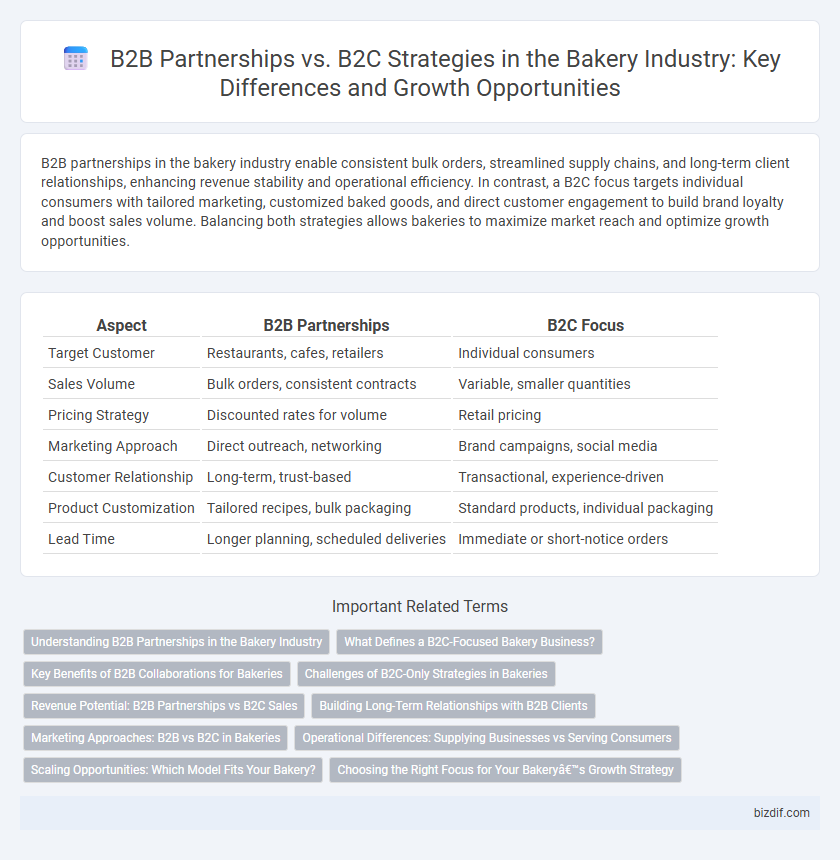B2B partnerships in the bakery industry enable consistent bulk orders, streamlined supply chains, and long-term client relationships, enhancing revenue stability and operational efficiency. In contrast, a B2C focus targets individual consumers with tailored marketing, customized baked goods, and direct customer engagement to build brand loyalty and boost sales volume. Balancing both strategies allows bakeries to maximize market reach and optimize growth opportunities.
Table of Comparison
| Aspect | B2B Partnerships | B2C Focus |
|---|---|---|
| Target Customer | Restaurants, cafes, retailers | Individual consumers |
| Sales Volume | Bulk orders, consistent contracts | Variable, smaller quantities |
| Pricing Strategy | Discounted rates for volume | Retail pricing |
| Marketing Approach | Direct outreach, networking | Brand campaigns, social media |
| Customer Relationship | Long-term, trust-based | Transactional, experience-driven |
| Product Customization | Tailored recipes, bulk packaging | Standard products, individual packaging |
| Lead Time | Longer planning, scheduled deliveries | Immediate or short-notice orders |
Understanding B2B Partnerships in the Bakery Industry
B2B partnerships in the bakery industry involve collaborations with suppliers, distributors, and foodservice companies to optimize supply chains and scale production efficiently. These partnerships enable bakeries to access bulk raw materials such as flour, sugar, and packaging at competitive prices while ensuring consistent quality and delivery timelines. Understanding the procurement needs and operational workflows of business clients helps bakeries tailor products and services, fostering long-term commercial relationships and sustained growth.
What Defines a B2C-Focused Bakery Business?
A B2C-focused bakery business prioritizes direct customer engagement by offering fresh, artisanal products tailored to local tastes and immediate consumption. It emphasizes personalized service, appealing storefronts, and convenient purchase options like online ordering or in-store pick-up to enhance the consumer experience. Rapid product turnover and seasonal menu variations help maintain customer interest and drive repeat sales.
Key Benefits of B2B Collaborations for Bakeries
B2B partnerships enable bakeries to secure consistent bulk orders, improving cash flow and production efficiency. Collaborations with suppliers and retailers foster cost savings through negotiated pricing and streamlined supply chains. These alliances also provide opportunities for innovation and brand expansion by reaching new market segments beyond individual consumers.
Challenges of B2C-Only Strategies in Bakeries
B2C-only strategies in bakeries often face challenges such as limited customer reach and inconsistent demand patterns, which can affect revenue stability. Direct consumer sales require extensive marketing efforts and customer service resources to maintain loyalty and attract repeat business. Conversely, relying solely on B2C channels may hinder opportunities for bulk sales and steady contracts that B2B partnerships typically provide.
Revenue Potential: B2B Partnerships vs B2C Sales
B2B partnerships in the bakery industry often generate higher revenue potential through bulk orders and long-term contracts with retailers, cafes, and catering companies. B2C sales rely heavily on consistent customer foot traffic and brand loyalty, which can result in steady but comparatively lower individual transaction values. Leveraging B2B partnerships can lead to scalable income streams and reduced marketing costs per unit sold compared to direct consumer sales.
Building Long-Term Relationships with B2B Clients
Building long-term relationships with B2B clients in the bakery industry enhances supply chain stability and increases recurring revenue through consistent bulk orders. Customized product offerings and reliable delivery schedules meet the specific demands of restaurants, cafes, and retailers, fostering trust and loyalty. Investing in collaborative marketing and co-branding efforts strengthens partnerships and drives mutual growth in competitive markets.
Marketing Approaches: B2B vs B2C in Bakeries
B2B partnerships in bakeries emphasize relationship-building with retailers, wholesalers, and foodservice providers, leveraging bulk order incentives and customized product offerings to drive consistent demand. B2C marketing strategies focus on branding, in-store promotions, and social media engagement to attract individual customers and boost impulse purchases. Effective bakery marketing integrates data-driven insights to tailor messages, optimize channel selection, and enhance customer loyalty across both B2B and B2C segments.
Operational Differences: Supplying Businesses vs Serving Consumers
B2B partnerships in the bakery industry emphasize bulk production, consistent supply chain management, and customized product offerings to meet the specific needs of retailers, restaurants, and cafes. In contrast, a B2C focus requires direct consumer engagement, flexible product variety, and real-time inventory management to cater to individual preferences and seasonal demand fluctuations. Operationally, B2B involves longer sales cycles and logistical coordination, while B2C prioritizes marketing, customer experience, and rapid product turnover.
Scaling Opportunities: Which Model Fits Your Bakery?
B2B partnerships in the bakery industry offer scalable opportunities through bulk supply contracts with cafes, restaurants, and retailer chains, ensuring consistent large-volume orders and steady revenue streams. B2C focus enables direct customer engagement, brand loyalty, and higher profit margins per item but requires robust marketing and operational management to scale effectively. Evaluating your bakery's production capacity, market reach, and growth goals is crucial to choosing a model that supports sustainable scaling.
Choosing the Right Focus for Your Bakery’s Growth Strategy
Selecting between B2B partnerships and a B2C focus significantly impacts a bakery's growth trajectory by determining market reach and revenue streams. B2B relationships, such as supplying cafes, restaurants, or corporate events, offer consistent large orders and long-term contracts that stabilize cash flow and reduce marketing expenses. Concentrating on B2C strategies involves engaging directly with consumers through retail locations or online sales, enhancing brand loyalty and enabling premium pricing through personalized customer experiences.
B2B Partnerships vs B2C Focus Infographic

 bizdif.com
bizdif.com